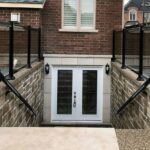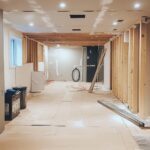Managing Humidity and Air Quality in Basements

Basement renovation projects offer the perfect opportunity to address and rectify issues related to humidity and poor air quality, which are common challenges in these below-ground spaces. Such environments not only compromise comfort but also pose significant risks to both health and the structural integrity of your home. Effective management of humidity and enhancement of air quality are critical components of any basement renovation, ensuring the space is not only aesthetically pleasing but also safe and sustainable. In this blog post, we’ll delve into the causes of humidity and air quality issues in basements and provide strategic solutions that can be integrated into your renovation plans.
Understanding Basement Humidity
Managing the humidity in your basement begins with understanding its sources and potential impacts on your home and health. Here’s what you need to know:
Causes of High Humidity in Basements
Basements often experience higher humidity levels due to several intrinsic and extrinsic factors:
- Natural Dampness: Being partially or fully underground, basements are prone to seepage from groundwater, especially after rain or snowmelt.
- Lack of Ventilation: With fewer windows and less airflow compared to other parts of a house, basements can trap moist air inside, exacerbating humidity problems.
- External Climate: Homes in areas with high humidity levels or heavy rainfall are more susceptible to basement dampness.
Effects of Excessive Humidity
The consequences of not managing humidity can be damaging and widespread:
- Mold and Mildew Growth: These fungi thrive in moist environments and can quickly colonize walls, ceilings, and personal belongings, posing health risks and unpleasant odors.
- Structural Damage: Excessive moisture can lead to the deterioration of building materials like wood and drywall, compromising the integrity of your home.
- Health Issues: High humidity levels contribute to discomfort and respiratory problems, and can exacerbate allergies and asthma by promoting the growth of allergens like dust mites.
Tools for Humidity Control
Effectively managing basement humidity is essential for maintaining a healthy, comfortable living space and protecting your home’s structural integrity. Here are the key tools and solutions to help you control moisture levels in your basement:
Dehumidifiers
Dehumidifiers are crucial for maintaining the right moisture balance. You can choose between desiccant dehumidifiers, which are best for colder climates, and refrigerant dehumidifiers, which are effective in warmer conditions. When selecting a dehumidifier, consider the size of your basement, the typical humidity level, and the unit’s capacity and energy efficiency. To ensure optimal performance, regularly empty the water reservoir, clean filters, and check for any blockages or leaks.
Ventilation Solutions
Improving air movement is key to preventing moisture build-up. Natural ventilation methods include using existing windows and vents to promote airflow. Consider installing window fans or opening vents to create a cross-flow of air. For basements without adequate natural ventilation, installing an exhaust fan or an air exchange system can mechanically remove damp air and introduce fresh, dry air.
Moisture Barriers
Installing moisture barriers is critical to prevent ground moisture from entering your basement. These barriers help prevent water seepage from the soil, especially in areas with high groundwater levels. Options for moisture barriers include sheet-based barriers like plastic sheeting or coatings like waterproof paint. Ensure a thorough installation, covering all exposed areas and overlapping sheets or coatings to prevent gaps.
Improving Air Quality in Your Basement
To complement your efforts in humidity control, improving the air quality in your basement is essential for ensuring a healthy and comfortable environment. Here are effective strategies to enhance air freshness and purity:
Sources of Poor Air Quality
Basements often suffer from poor air quality due to several reasons. Off-gassing from building materials and furniture can release volatile organic compounds (VOCs), accumulating in poorly ventilated areas. Additionally, stagnant air without proper airflow can trap pollutants such as dust, mold spores, and other irritants.
Air Purification Strategies
Addressing air quality involves a combination of purification and ventilation enhancements:
- Air Purifiers: Installing an air purifier can significantly reduce airborne pollutants. Models with HEPA filters are especially effective, capturing fine particulates including mold spores, dust, and pollen.
- Houseplants: Incorporating houseplants like spider plants, peace lilies, and snake plants can improve indoor air quality. These plants absorb toxins and produce oxygen, naturally purifying the air.
- Regular Cleaning: Maintaining cleanliness through regular dusting and vacuuming is vital. A clean basement prevents the accumulation of dust and allergens, contributing to better air quality.
Ventilation Enhancements
Enhancing ventilation is crucial for circulating fresh air and expelling polluted air. Opening doors and windows when possible promotes natural air flow, helping to remove contaminants and introduce fresh air. In cases where natural ventilation is insufficient, installing mechanical systems such as exhaust fans or a heat recovery ventilator (HRV) can effectively exchange stale indoor air with fresh outdoor air without significant energy loss.
Implementing these measures will not only make your basement a healthier part of your home but also enhance the comfort and safety of the space, protecting any renovations or stored possessions.
Transform Your Basement with Yorkland Homes
Effectively managing humidity and enhancing air quality are key to transforming your basement into a healthy, comfortable living space. These improvements not only make your basement more enjoyable but also safeguard your home’s structure and increase its value. Whether you’re dealing with persistent dampness, poor air circulation, or health concerns due to allergens, the right strategies can make a significant difference.
Ready to take the next step in your basement renovation? Yorkland Homes specializes in turning underutilized basements into vibrant, functional spaces. With our expertise in the Greater Toronto Area, we ensure that every aspect of your basement renovation — from humidity control to air quality enhancement — is handled with professional care and precision. Contact Yorkland Homes today, and let us help you revitalize your basement into the perfect space for your family’s needs and lifestyle.








